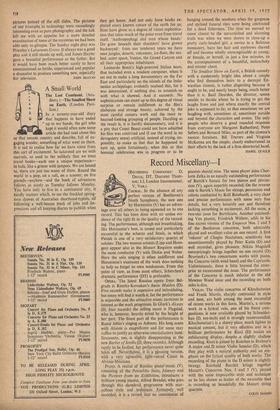Record M iscellany I
(RECORDING COMPANIES: D, Decca; DT, Ducretet Thom- son; LI, London International; V, VOL) CHORAL. In the absence of any perfect version of Beethoven's Ninth Symphony, the new one by Horenstein (V) has an advan- tage over all others in being squeezed on to one record. This has been done with no undue evi- dence of the tight' fit in the quality of the record- ing. The performance, although not breathtaking, like Horenstein's best, is sound and particularly successful in the scherzo and finale, in which Patzak is one of a very satisfactory quartet of soloists. The two women soloists (Lipp and Hoen- gen) appear also in the Mozart Requiem under the same conductor (V) with Dickie and Weber. Here the solo singing is often indifferent and Horenstein's treatment of the work does nothing to help us forget its Own weaknesses. From this point of view, as from most others, Scherchen's dramatic performance (DT) is preferable.
OPERA. The latest Russian opera from Bel- grade is Rimsky-Korsakov's Snow Maiden (D). Five records make it expensive and intimidating, but many will find it worth it, for the performance is enjoyable and the attractive music increases in interest as the work progresses. In Gluck's Alceste (D, four records) the selling name is Flagstad, who is, however, heavily taxed by the height of her part. The. finest part of the performance is Raoul Jobin's singing as Admeto. His long scene with Alceste is magnificent and for some may suffice to justify an otherwise.unsatisfactory issue. Simionato, too, is slightly disappointing in the new Barber of Seville (D, three records). Although rarely to, be faulted, her performance never quite takes off. i:Teverthelessi, it is a pleasing version, with a very agreeable, light-voiced Count in Alvinio Misciano.
PIANO. A recital of RusSian piano' music (V), consisting of the Petrushka 'Suite, Islatney and the Pictures from an .Exhibition. introduces a brilliant young pianist, Alfred Brendel, who goes through this •daredevil, programme with mar- vellous style , and „teqhuique., Extremely well recorded, it is a record that 'no connoisseur of pianists should miss. The same player joins Char- lotte Zelka in an equally outstanding performance of Bartak's Sonata for two pianos and percus- sion (V), again superbly recorded. On the reverse side is Bartok's Music for strings, percussion and celesta conducted by Rolf Reinhardt, a very clear and precise performance with some very fine details, but a very leisurely one and therefore lacking something in excitement. All the same, a two-star issue for Bartakians. Another outstand- ing Vox pianist, Friedrich Wuhrer, adds to his fine recent version of the Emperor Nos. 2 and 3 of the Beethoven concertos, both admirably played and excellent value on one record. A first `volume' of Chopin Nocturnes, sensitively but unsentimentally played by Peter Katin (D) and well recorded, gives pleasure. Nikita Magaloff enterprisingly brings together on one record (D) Stravinsky's two concertante works with piano, the Concerto (with wind band) and the Capriccio. Unfortunately, there is little beyond the enter- prise to recommend the issue. The performance of the Concerto is much inferior to the old Mewton Wood issue and the recording on both sides is dim.
VIOLIN. The violin concertos of Khachaturian and Frank Martin, sharply contrasted in style and tone, are both among the most successful of recent works in this form. Martin's, a serious work in a lyrical vein, one of his finest com- positions, is now available played by Schneider- han (D, ten-inch) and is strongly recommended. Khachaturian's is a showy piece, much lighter in musical content, but it very effective and in a brilliant performance by Ricci (D) makes an exhilarating display,: despite ,a slightly shallow• recording. Ricci is.joined by Katchen in Brahms's A major and D minor Violin Sonatas (D), which they, play with a, natural authority and an em- phasis on the lyrical quality of both works. The recording of the piano in the D minor is slightly twangy. Reinhold Barchet brings together Mozart's Concertos Nos. 3- and 5 (V), played with the same impeccable style and technique as he has shown as leader of the ensemble that is• recording so beautifully the Mozart string quartets.
COLIN MASON


































 Previous page
Previous page